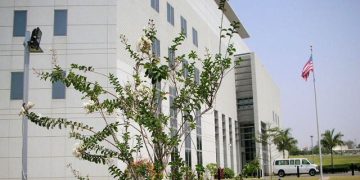The Managing Director, Ecobank Nigeria, Patrick Akinwuntan has advocated the use of artificial intelligence to predict security threats and proffer solutions. Akinwuntan who made this assertion at a webinar themed, “Cyber threat Landscape: Financial services, 2021 and beyond.”organised by Information Security Society of Africa, Nigeria (ISSAN) on Tuesday, said as cyber-attacks continue to grow in intensity and frequency, Artificial Intelligence (AI) can be a game changer, stressing that the manual and semi-automated techniques of monitoring and responding to systems issues of the past are grossly inadequate to take care of the risk of the future.
He regretted the renewed cyber attacks on businesses globally occasioned by new technology and Covid 19 pandemic, “Technology has evolved and has changed the way we operate. Covid 19 only further accelerated the adoption of technology. Artificial intelligence, automation, internet have all created the opportunities for business to unlock more values, but cyber threats have also increased both in complexity and volume,” adding that “The new normal of working from home has further exposed institutions to cyber-attacks and data breaches. Endpoints for remote access must be secured or else institutions are exposed to attack by mismanaged endpoint. There is also the aspect of insider threat and exposure of password.”
Further, Mr Akinwuntan identified other threats faced by financial institutions and organisations across the world to include cloud security threats and supply chain attack, stressing that a breach on one vendor could have ripple effects on the organizations.
Deputy Governor, Financial Systems Stability, Central Bank of Nigeria (CBN), Mrs. Aishah Ahmad, who was represented by the Director of Information Technology (IT) at CBN, Mrs. Rakiya Mohammed said the conversation around cyber threat could not be more important than now, stressing that the apex bank was committed to strengthening the security framework of financial institutions to prevent the proliferation of such threats. She noted that “The financial sector is particularly susceptibility to cybercrime, given its crucial roles in financial intermediation in a highly connected financial system. CBN is committed to strengthening its regulatory and supervisory framework for cyber risk and vulnerability testing for the banking sector.”
In his presentation, US -based Cyber Security expert, Dr. Austen Ohwobote advised that as the pace of digital disruption accelerates and innovative new technology reach the market, organizations should put measures in place to check cyber crimes. He listed the different cyber-attacks such as web-based attack, third party attack, insider threats attacks, and advised organisations to put resilient structures in place in order to understand the nature of attacks and when attacks are about to happen.
For financial institutions to adequately check cyber crimes, he called on organisations to adapt and implement cyber security as a guide, recognise cyber security as big issue, appoint cyber security ambassadors, raise customer awareness, emphasize strong password and Multi-Factor Authorization (MFA), adding that cyber security expert should be a member of decision making and re-emphasize third party vendor management.
ISSAN President, David Isiavwe, called on financial service providers and other organisations that handle large data of customers, to consider putting the right measures in place in order to safeguard their operations. He stated that the advocacy group will continue to create cybersecurity awareness and data handling.
ISSAN is a not-for-profit organization dedicated to the protection of Nigeria’s cyberspace. It is also significantly involved in ensuring the security of Banking Systems and applications, ATMs, e-government systems and the entire cyberspace in Nigeria. It operates through awareness heightening measures including the promotion of appropriate legislation and best practices. ISSAN has proved to be a veritable platform for collaboration and exchange of ideas by members of the Banking and e-commerce public especially with regard to safekeeping of PINS, controls over passwords, access to the internet as well as steps organizations should take to keep their systems healthy and safe at all times.
















